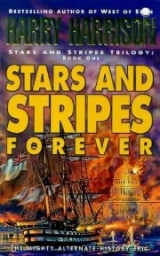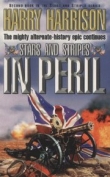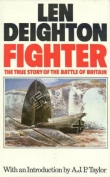
Текст книги "Stars and Stripes Forever"
Автор книги: Harry Harrison
Соавторы: Harry Harrison
Жанр:
Альтернативная история
сообщить о нарушении
Текущая страница: 19 (всего у книги 23 страниц)
“The Union must again be one.”
As the President concluded the hushed silence with which the Congressmen had listened to him was broken by a mighty roar of approval. Even the most ardent abolitionists, long seeking punishment of the slave-masters and the rebellious, were carried away by the spirit of the audience.
The motion to prepare a bill was carried unanimously.
DEFEAT – AND A NEW FUTURE
The Battle of the Hudson Valley was drawing to a close. And there was disaster in the making for the exhausted British troops. English, Scottish, Welsh and Irish soldiers were mixed together now. They had cohesion of a sort, they obeyed their officers because they knew they were all determined on one thing. Escape. But this was not an easy thing to do because the American forces were growing as theirs were reduced in number. With the armies of Grant and Lee pushing close behind them, the British had no choice but to flee north. But there was still no escape. The American cavalry harassed their flanks and cut up their supply trains. By the time they had reached Glens Falls their numbers had been halved by wounds, death and surrender. The last became the only option for the ordinary soldier when all the officers and non-commissioned officers were dead, all the ammunition used up. There was no dishonor for an exhausted man to drop his weapon and raise his hands to the sky. Rest, surely, food and water possibly. Road’s end, definitely.
Some of the reinforcements fought on. The 62nd Foot had come late to this war, had actually returned from India to be refitted and sent across another ocean to do battle. They were tough, professional soldiers, who had fought in Afghanistan and other embattled countries at the extreme edges of the British Empire. They were accustomed to attacks by irregular horsemen so stood up well to cavalry harassment. They fought in retreat as they did in advance. Since they had never contacted the main bodies of the pursuing armies they were relatively unscathed.
Their commanding officer, Colonel Oliver Phipps-Hornby, was proud of his men and wished he had done better by them. Lake Champlain had promised succor. The boats that had brought them here from Canada would return them the same way. But the scouting patrol he had sent ahead returned with the most depressing news possible.
“Gone, sir,” Lieutenant Harding reported. “Not a boat in sight at the landings or along the shore.”
“You are sure?”
“Positive, Colonel. There were some wounded at the landing, with a surgeon, they had been evacuated to the rear some days ago. One of the wounded, a sergeant, told me that the boats had been there, waiting for us, but they were driven away by enemy artillery. They must have approached under cover of darkness because he said that the firing began at dawn. Some of the boats were sunk, all the rest fled north. The sergeant said that the enemy artillery then limbered up and went north after the boats. There was also some infantry with them, maybe just a regiment.”
“I don’t understand – how could this happen? The enemy is south of us, flanking us as well. How could they also be to our rear?” The colonel was baffled, wiping at his long mustachios as he tried to digest this dire news. The lieutenant opened a folded and dusty map and pointed.
“Here, sir. I think that this is what happened. You must remember that this is a large country with very few decent metaled roads, unlike Britain. What really connects the different states is the railway network. Look here, see how dispersed and widespread it is. A line here and here, another here. Now, if you will look at Plattsburgh, where we fought through last week. You see this railroad track that begins there and goes south and west through New York State and on to Pennsylvania. It is just possible that the American troops and field batteries could have been sent by train to go around our flank.”
“But our troops still occupy Plattsburgh.”
“Doesn’t matter. The enemy could detrain anywhere near here and move south behind us, and they could have reached Lake Champlain here. Once in position they opened fire to drive off our boats. Then they followed them back along the lake to keep them from returning.”
“These trains, a bloody nuisance. Though I must admit that these colonials make very good military use of them.”
“Your orders, Colonel?”
The quiet words brought Phipps-Hornby back to the present. The intensified firing to the south meant that an attack in some strength was in progress. As politely as possible Lieutenant Harding had pointed out that the regiment was still in danger.
“Outlying parties, fire and retire. We’ll pull back to the last defensive position on that ridge. Issue the command.”
Fire and retire the bugles sounded. With practiced skill the men of the 62nd disengaged from the enemy and pulled back through the other defenders. Line after line of them until they were all in the prepared positions.
Lake Champlain was behind them and, apparently, the entire American army was across their front. Soldiers in Blue and Gray were taking up positions in the fields that they had just crossed. More and more units moving around to their flanks. While file after file of British prisoners could be seen marching off dejectedly toward the enemy’s rear.
On a hillock behind the enemy lines the colonel could see a gathering of mounted officers. Under two flags still, but united in every other way. Not for the first time did he wonder how all of this could have happened. What should have been the simple invasion of a weakened and warring country, appeared to be ending in this debacle.
A bullet tore through the shoulder of his jacket, ripping the epaulet away, and he dropped instantly to the ground. Too many officers had paid with their lives by exposing themselves to the enemy marksmen. At a thousand yards they still exacted a bloody toll.
General Sherman had his glasses on the enemy, sweeping along their defenses. He saw that an officer there was doing the same thing, when he dropped suddenly from sight. The United States Sharpshooting Corps had wreaked havoc among the enemy leaders and was still doing its deadly work. They stayed behind the first line of troops and advanced with them. Whenever the enemy went to ground and the line became static they went forward to practice their murderous skill.
Behind the entrenched enemy could be seen a blue patch of Lake Champlain, the goal of the retreating troops, the end of the battle surely. Sherman knew that what he had caused to be done had to be done. The enemy had to be defeated – and now it was. Suddenly he was very tired of the killing. He lowered his glasses and turned to his commanding generals, joined together now for the first time since the battle had begun.
“Gentlemen, war is hell and I for one have had enough of it for the time being. Their wounded are scattered all along the lake shore and that regiment on the ridge appears to be the only sound unit left. Get a flag of truce over to their commander and see if we can arrange a surrender, before more of our good boys are killed. I care not for the enemy lives, but would grieve at any more loss of American ones right now. The men deserve some reward for the magnificent battle that they have fought.”
“I am in agreement to that,” General Lee said.
“And I,” said Grant. “And I also would like to have a good talk to that commanding officer. I have not seen one of them over the rank of lieutenant alive since our attack began.”
Lincoln was looking through the newspapers, shaking his head with sadness.
“There is a shadow over this land, Nicolay. In the midst of happiness at our victories there is this note of great sadness. A New York company wiped out almost to a man. Apparently because they were Irish. Can this be possible?”
“Not only possible – but highly probable, Mr. President. Certainly the Irish in New York City think that is what happened, and they should know. Almost all of them were born in the old country. If there could possibly be a good side to this massacre, it means the end of draft riots there. Not only have they stopped rioting but the Irish are volunteering in large numbers, fit and angry men…”
“He’s done it!” Hay cried out as he threw the door open, waving the sheet of paper. “Sherman has wiped out the invaders, seized thousands of prisoners. The battle is over, the invasion ended.”
“That is wonderful news indeed,” Lincoln said, letting the newspapers drop to the floor as he seized the telegram. “This is most important and timely. Send it on to Jeff Davis at once. He will be as overjoyed as we are, and badly in need of any support.”
The telegram that President Jefferson Davis received not only filled him with an immense happiness and a feeling of relief – but was most opportune as well.
“It could not have come at a better time,” he said, striking the most fortuitous sheet of paper with his hand. His carriage was at the door waiting to take him to the Cabinet meeting that he had called at the Council Chamber in Richmond. He planned to go over with them the details of the speech he wanted to give at the Confederate Congress and the agreements he proposed to put forward. This would not be an easy thing to do. But it might be easier to get them on his side when he told them of the great victory that had just occurred. The Battle of the Hudson Valley was over, the last of the invaders had surrendered. And it was Southern troops as well as Northern troops who had effected defeat of the enemy. Biloxi had been avenged. He must remind them of that and hopefully carry them along with his new proposals in the heat of success. A new and most decisive political battle was about to begin. He needed all the support he could get from his Cabinet if it was to be fought in the manner that he and Lincoln desired.
One slave helped him on with his coat, another opened the door and handed him up into the carriage. Slaves, he thought as the driver cracked his whip and they started off at a merry clip.
Solve the slavery question and the Union was saved.
But that was not going to be a very easy thing to do.
Most of the Cabinet were already there when he arrived. Rotund and stubby Judah P. Benjamin, the Secretary of State, was talking to James A. Seddon, the Secretary of War. Seddon, tall, lean, dressed in black and wearing a black skullcap, looked more Jewish than Benjamin did, although he was a Virginia aristocrat. Davis looked to them for support: Seddon had once even advocated arming the Negroes; thinking the unthinkable. He was an intelligent enough man to think positively and possibly override inborn prejudices.
Seddon should aid him, but Davis was not so sure of Christopher G. Memminger from South Carolina. He was Secretary of the Treasury and had a wicked temper. As had Stephen Mallory, the Secretary of the Navy. He was the son of a Connecticut Yankee and had helped his mother run a boarding house for sailors in Key West. This surely had not been easy; but he was a quick man with his fists.
The door opened and John H. Reagan, Postmaster General, came in with Thomas Bragg, the Attorney General.
“I see that all members of the Cabinet are present,” Jefferson Davis said, seating himself at the end of the long table. He took the folded sheets of his speech from his jacket pocket, started to put them on the table, then changed his mind. He knew it by heart and he wanted to watch their reactions to his proposals. He opened the table drawer and put it inside, next to the revolver pistol that he kept there.
“Gentlemen – do any of you have any urgent business that we need to hear before we get to the substance of the meeting?”
“Need more money in the Treasury,” Memminger said, and there was a murmur of laughter. The Treasury was always short of funds.
“Any other?” Davis asked, and the rest of the Cabinet members shook their heads. “Good. Then to the matter of the proposed bill. The North has given us certain assurances that we must consider deeply before we think of the assurances that we must give in return. There must be the end of all abolitionist attacks and propaganda. That is essential.”
“Not only essential, but vital,” Bragg said. “Particularly when we try to persuade the planters to sell their slaves.”
“I agree…”
Davis broke off as the door to the hallway was swung open so hard that it crashed against the wall. Leroy P. Walker, the former Secretary of War stormed in. Davis had dismissed the tall Alabaman from his Cabinet and in doing so had made an enemy for life.
“This is a private meeting and you are not welcome here,” Davis said.
“Of course it’s private ’cause you and the other traitors are trying to sell the South down the river like some ol’ nigger woman.”
“How do you know what we are doing here?” Davis said, mouth tight with cold anger.
“I know because at least one of you ain’t a traitor and told me what you were planning.”
“Walker – you are no longer a member of this chamber and you are not wanted here,” Mallory shouted, jumping to his feet and striding forward.
“Maybe I ain’t – but you going to hear what I say first. Now – stand clear!” Walker shouted as he stepped aside quickly so his back was to the wall. “Now you listen while I speak – and listen good.”
He took a long cavalry pistol from inside his jacket and pointed it at them.
Seddon spoke slowly and calmly in his deep Virginia accent. “Put that away, Leroy. This is the Conference Chamber of the Confederacy and not some white trash saloon.”
“You hush and listen to me – ”
“No!” Mallory shouted, lunging forward and grabbing him by the arms.
They struggled, cursing, and the gun fired with a muffled crack.
“Shot me…” Mallory said weakly and he fell to the floor.
Jefferson Davis had the table drawer open and was taking out his pistol.
Walker saw the movement, turned and fired. Just as Davis pulled the trigger of his own gun.
There was stunned silence after the two shots; gunsmoke drifted across the chamber. Walker lay dead on the floor with a bullet hole in the center of his forehead.
They rushed to Davis, stretched him on the floor. His eyes were closed and his jacket was soaked with blood. Reagan opened an immense clasp knife and cut his shirt and jacket away. The bullet had entered his chest just below his shoulder blade and was oozing blood.
“Use this,” Seddon said, taking a large white kerchief from his tailcoat pocket; Reagan pushed it against the wound.
“Will someone go for the surgeon!”
Davis sighed and opened his eyes, looked up at the men grouped around him. “Walker…?” he asked weakly.
“Dead,” Judah Benjamin said, kneeling at his side. “Memminger has gone for the doctor.”
Jefferson Davis looked up at the circle of worried men. They had to carry on, finish the work that he had begun. Good men all of them, supporters and friends. Some not too bright, some very bigoted. Who could he rely on? His eyes stopped moving and rested on the rotund figure and concerned face of Judah P. Benjamin. The brightest of the lot. The peacemaker. Would he be able to work for the greater peace of the country?
“Take care of things, Judah,” Davis said, trying to sit up. “You are the one who can sow accord – and you are the brainiest one here. See that this war is ended and peace is made.” He raised his voice a bit. “Have you all heard me? Do you agree with me?” One by one they nodded in silence as he looked around the circle. “Then the matter is settled. I have faith in Judah Benjamin and you must have too…” His eyes closed and he dropped back to the floor.
“Is he… dead?” someone asked in a hushed voice. Benjamin leaned his head close to Davis’s mouth.
“Breathing still. Where is that doctor?”
Two days later Judah P. Benjamin rose to speak before the assembled Congress of the Confederacy. He had studied Jefferson Davis’s speech, improved it where he could, made sure that all of the proposals were outlined in the greatest detail. Now he must read it with the greatest sincerity. The Congressmen must be convinced.
“You all know what occurred at the fated meeting of the Cabinet. Two men dead, Jefferson Davis wounded, possibly mortally. His last conscious words were for me to speak for him, and I do that now. He asked me to read this proposed speech and do my utmost to convince you all that this is the wisest and sanest course to follow.
“As all gathered here know, the Congress of the United States has agreed to reunite this country in a manner that will be satisfactory to all and repellent to none. You all will have read the bill and pondered on its significance. If we here, in Congress assembled, agree upon its merits we will declare, in essence, that the War between the States is over. Brother will no longer kill brother.
“In all this wretched struggle it is mournful to reflect that the real difficulties spring more from the selfish passions of men rather than from the necessities of the case. In border states slavery is already declining from natural causes. If only intemperate and too often unprincipled abolitionist agitation of the subject for electioneering purposes in the North would stop, slavery in the border states would disappear in five years. The President of the United States has assured me that it will.
“War causation tends to be explained in terms of great forces. Something elemental is supposed to be at work. It is not. People stumble into war for many reasons – some of which they are not even aware of. Now a war that has occupied us has ended by the invasion by a more threatening enemy.
“This war that is now suspended by a cease-fire was not started by slavery or anti-slavery, states rights or Lincoln’s election or slavery in Kansas. If you wish to take one word to explain it it would be none of these. It would be fanaticism – on both sides – misunderstanding, misrepresentation, or even politics.
“I therefore ask you to take action on the proposal of the United States Congress. I ask you to look into your hearts and seek agreement. How you decide here will affect thousands alive, millions still unborn. Your decision will essentially end this Confederate Congress, but it will also see the rebirth of a wounded country. We will sit side by side with our brothers from the North to save these United States from a greater threat. Do not forget that in our hour of peril they came to our aid. They were not asked, they volunteered. With their aid – and the deaths of their soldiers – a blood pact was signed that Biloxi would be avenged. And so it has been. Let us seize on this fact and remember it – and try not to dwell upon the war that has now been put aside by armistice. Let us search our hearts and find an honorable way to extend that armistice and put the war behind us. I formally request you all to vote to accept the proposals put forward by the Congress of the United States.”
There was no overt reaction when Judah Benjamin stopped speaking. There was a mutter of comment, then one voice louder than the others broke through.
“Judah Benjamin you are a damned Judas – like the other Jew who betrayed our savior – selling out your birthright, your friends and family, your country – for damn Yankee promises.” It was Lawrence M. Keitt, the fire-eating Congressman from South Carolina, a slaveholder, very rich and very sure of the right of his cause.
“I sell out nothing, Congressman Keitt. But I do resent your tone, and reject your racial insults. If we were not fighting the British invaders I would call you out to defend my honor. But we have all seen how disastrous it is to mix guns with politics. That I do not challenge your insulting slurs means that I must be strong and not be provoked – as all of you must be as well. We must put personal feelings and honor aside in order to reunite this country.”
Keitt grew even more angry at this. “And I resent your tone and your arguments. My slaves are my property and no man will take them from me. And as for my honor, sir, I value it just as you do yours. I will be happy to face your gun, now or at any other time.”
“Do you threaten me, Mr. Keitt?”
“More of a promise than a threat.” But the arrogance in his voice belied the words. He loosened his pistol in his tailcoat pocket. Benjamin pointed at it.
“You have brought a gun into this Congress to enforce your threat? You do this after what has happened to Jefferson Davis?”
“A gentleman does not go about unarmed – ”
“Sergeant at arms,” Benjamin called out. “Arrest this man for his threatening behavior.”
He had planned for this and the squad of soldiers was ready. All of them veterans of battle, all returned home to recuperate from wounds. All grimly eager to see the end of this war. Keitt shouted angrily and pulled out the pistol – but was quickly disarmed and half-carried, half-dragged from the hall.
There was much argument and raised voices at this, but Benjamin would not permit dissension to rule.
“The dead, think of the dead. Do we really want to begin over again a war that has been brought honorably to an end? Must we once again pick up the guns that have been peacefully laid down, and once again begin killing each other? Have we learned nothing from the deaths of our loved ones? You are the ones who must decide – and posterity will never forget what was decided here this day.”
One by one they were won over until, at close to midnight, the final vote was made to accept the conditions of the Congress.
It was carried by the smallest of majorities.
A single vote. But it was enough.
The War of Secession was over at last.








